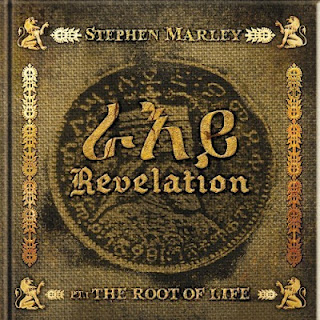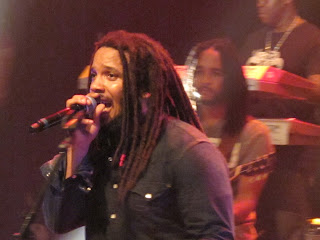 |
| Stephen Marley in concert in Paris |
Stephen even brought his own son, Jo Mersa, out on stage to join him on songs such as “Could You Be Loved” and “Redemption Song”. The well-known melodies got some of the biggest cheers from the young and diverse crowd, who sang enthusiastically along and waved their arms (and lighters) in the air.
Stephen - a singer, producer, songwriter and talented musician in his own right - mixed the famous Marley standards with material from his Grammy-winning album Revelation Part 1: The Root of Life, for a memorable concert. The audience grooved to “Made in Africa ”, “Now I Know” and the very infectious “The Chapel” (sample lyrics: “take your troubles to Selassie, he’s the only king of kings”).
The Paris
McKenzie: What is it like performing in France
Marley: It’s wonderful to be in France France
McKenzie: You performed at Reggae Sun Ska (an annual festival near Bordeaux
Marley: Great vibes. Wonderful vibes. It was a very diverse crowd and it was great to see the different cultures all coming together.
McKenzie: Let’s talk about the “Marley” documentary, which is currently in cinemas in Europe . What do you think of it?
Marley: Great. (Long pause.) What you want me to say?
McKenzie: Well, is this a “correct” picture of your father?
Marley: A correct picture? I’m a man myself. I have many moods. There are different tears to me, and different sides of me. It’s not just what you see on the stage. So, that’s a part of Bob that you’re seeing. You can’t depict Bob in two hours, or an hour and twenty minutes. Take what you want to take from it. What you didn’t know, you learn. If you never know that, then you learn that. That’s Bob, you know what I mean.
 |
| The cover of "Revelation Part 1" |
McKenzie: Yes. All right. You won a Grammy for the latest album Revelation Part 1. Congratulations. You’re going to do a follow up?
Marley: Yes, Part 2. We were in the studio last night working on it
McKenzie: When is it scheduled to be released?
Marley: It’s like a tree, you know. It’s growing, and it’s blossoming, but it’s not ready as yet.
McKenzie: Some of the songs that you performed tonight were very personal …
Marley: All of them.
McKenzie: That continues on the next album?
Marley: Well, this was Part 1: The Root of Life, like the root of a tree. Part 2 is called the Fruit of Life, and we’re talking about how the tree blossoms, and the different colours of the fruit and leaves. So Part 2 is more of an eclectic album. It’s building on the foundations.
McKenzie: You asked the audience if they loved reggae music and they screamed yes. But reggae music is not just Jamaican anymore, it’s global now, with a lot of African musicians, for instance. How do you see this – as competition or as positive development?
Marley: Yeah, man, it’s positive. The Bible tell you … Jah say that if who him choose don’t deal with it, him shall cast stones. So that’s how it’s supposed to be. We who come from the root have to realize that it’s not just us. So we must maintain the integrity and the essence of where it’s coming from so that the music can be respected at all times. We have to know what we doing as the root. It’s great to see our branches and to come to Paris
 |
| Marley: "You don't have to have music that degrades." |
McKenzie: Okay, so that leads me to the question - what do you think about dancehall music, especially as regards women?
Marley: Oh bwoy! (Takes deep breath.) Well, first of all, dancehall music was always around. It’s a deep part of Jamaican culture. I remember being around my father and seeing Big Youth coming into Hope Road. I also remember Dillinger at Hope Road talking with Bob. So even my father was a great fan of the toasting, you know, the ability to rhyme lyrics and put it together pon a dub. It was great, man. So dancehall is a big part of our heritage. It used to be the voice of the people, it used to be about rebelling against certain things and about the integrity of who we are as Jamaicans, as a struggling people, as a Third World country plagued by politics.
Now, the question is what I think about dancehall. I don’t agree with things that don’t uplift you. Is empty barrel make the most noise, dem say. So all of dem that you see jumping up and a-go on, making the most noise. Is empty barrel that, man, and you confuse the people. I don’t say we mustn’t have fun, or that there mustn’t be fun songs. You must still have simple songs, good songs that make you want to dance and feel good, and don’t have to think bout nothing. But you don’t have to have songs that degrade one. I don’t agree with it. Woman is the mother of creation. Could not be here without you, Mummy. Man can’t do that, see it? So, all honour to the woman.
 |
| Marley with son Jo Mersa (right) |
McKenzie: Thanks! Final question. This has been a hectic tour, going from city to city with a concert nearly every day. It hasn’t been too tiring for you?
Marley: I feel good! Some days are better than some. But this is what we signed on for. This is why we are here. So we have no complaints. It’s wonderful to be able to say “the tour is hectic” versus “bwoy, we can’t get enough shows”. So, we’re privileged.
(Copyright SWAN 2012. Thanks to Nicole Webley for technical assistance.)
